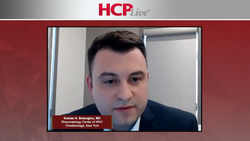Treatment of Rare Systemic Autoimmune Rheumatic Diseases (SARDS): Systemic Lupus Erythematous (SLE) and Idiopathic Inflammatory Myopathies - Episode 5
The Future of Individualized Therapy in SARDs
A thought leader in rheumatology, Kostas N. Botsoglou, MD, highlights the importance of individualizing therapy for SARDs and shares insight into novel treatments on the horizon that may address current unmet needs.
Kostas N. Botsoglou, MD: The choice of therapy is highly individualized to optimize our treatment plan. It depends on what predominant symptoms the patients are experiencing, what organs are involved, any response to previous therapies—perhaps in that same class—as well as the patient’s disease activity and severity. The adverse effects of these agents and patients’ preferences and comorbidities should also considered when determining therapies.
There’s a tremendous unmet need in this field. We lag behind medications that have been approved for rheumatoid arthritis and arthropathies. However, there are some exciting new medications and novel mechanisms that are being investigated. Specifically, in lupus we have recent approval of a structurally modified calcineurin inhibitor with a dual mechanism of action leading to increased integrity in the immunosuppression of T-cell activation. There’s also a monoclonal antibody, anifrolumab, designed to treat systemic lupus. Here it binds to type 1 and 2 interferon receptor, which should include interferon-alpha and interferon-beta. So it’s an exciting time with new medications on the horizon hopefully addressing unmet needs for our patients.
Another medication I’m excited about is obinutuzumab, which is used for chronic lymphocytic leukemia. This is a fully humanized monoclonal antibody that binds the epitope of CD20, and it partially overlaps with the epitope recognized by rituximab. We’re excited to have newer MOAs [mechanisms of action] and newer monoclonal antibodies available for these conditions. We’re still trying to understand these rare diseases. Attacking them from multiple angles with different pathways may lead to exciting outcomes.
With novel agents on the horizon, this is an exciting time for our rheumatologic patients and rheumatologist alike. Treating rare systemic autoimmune diseases is a very complex process, and having new treatment options and novel mechanisms of action might provide better outcomes and new opportunities for many patients who, for too long, may have been undertreated.
Thank you for taking the time to listen. I hope this has been a useful presentation. I look forward to seeing my colleagues again soon.
Transcript Edited for Clarity



